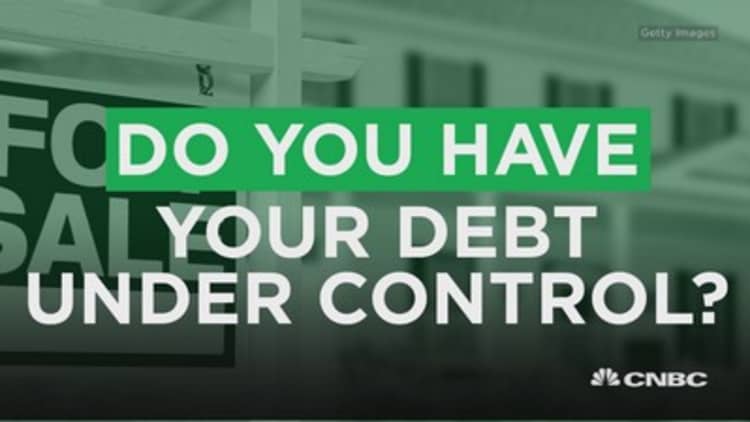
In a perfect world you'd pay cash for everything and never need to go into debt. While that utopia may exist for the financially well-disciplined, for many others it's just not possible.
In an annual survey, NerdWallet found Americans are loaded with debt, owing an average per household of $132,529 (including mortgages and student loans), at the end of last year.
While some forms of debt are better than others, financial advisors say owing too much can become a vicious cycle that's hard to break.
"A warning sign to me would be anything beyond school debt or home debt," said Josh Jalinski, president of Jalinski Advisory Group in Toms River, New Jersey. "Anything else becomes a noose around the neck of the person."
Kick the credit card habit
The amount Americans owe on their credit cards just surpassed $1 trillion according to Nilson —a publication that tracks the payments industry. If you're trying to clean up your finances, this kind of revolving debt should be viewed as public enemy No. 1.
"Carrying a credit card balance for any longer than that one-month period is a warning sign you've got a debt problem," said Jeff Boyer, a partner at RegentAtlantic in Morristown, New Jersey. "They should be paid off in full every month with very little exceptions."
More from Your Money Your Future:
How (and when) to choose between debit and credit
Do you want to manage your budget and bills? There's an app for that
Why everyone needs to check their paycheck
The reason has mostly to do with interest rates which currently are about 16.43 percent for cards and have been steadily rising since December, according to Bankrate.
Even if you're making regular payments above the minimum, getting your balance down to zero will take time and cost you a lot in interest. Jalinski says this snowball effect is why he tells clients to stop making contributions to their 401(k) plan and use that money to pay off their cards instead.
Bottom line, if you can wipe out debt do it, Boyer said.
"Never carry a cash reserve in lieu of paying off debt," he said.
'Safe debt' is OK but in small amounts
Some debt, such as a mortgage or small amount of student loans, is fine to carry month to month because they can offer certain tax breaks and give you an opportunity to use some of your monthly cash flow to invest or build up savings.
But even here you need to borrow wisely, said Jalinski. "Safe debts are home mortgages, unless you're using it to buy a boat. Use home equity to conserve rather than to consume," he said.
Once you're debt-free start to save
Having more cash on hand, as an emergency fund, to pay for the unexpected is one easy way of staying debt-free. Therefore, building up that rainy day fund should be a priority. Ideally, it should be enough to pay three to six months' of living expenses, experts say.
One way to put your savings on autopilot is to call your human resources department at work and ask them to split your pay in two — to your checking account and a savings account that you don't touch. Even just siphoning off a small percentage will give you a pile of cash you can dip into when you need it.






